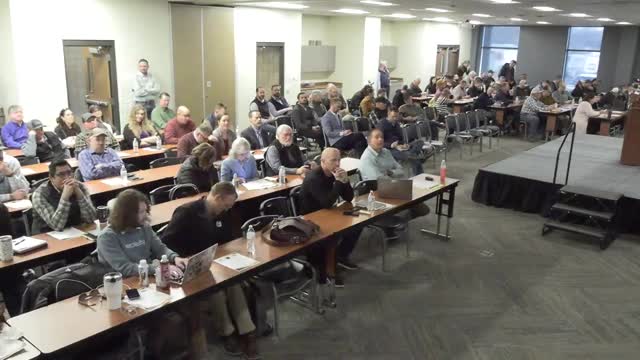Foundation describes loans to bring LPG to Kenyan and Ghanaian households
Get AI-powered insights, summaries, and transcripts
Subscribe
Summary
Anne Hyer of the Bettering Human Life Foundation told Uinta Basin meeting attendees that the group is financing local entrepreneurs with low-interest loans to expand liquefied petroleum gas (LPG) access and credit plans for households and schools in Kenya and Ghana.
Anne Hyer, representing the Bettering Human Life Foundation, told attendees at the Uinta Basin Collaborative meeting in Duchesne County that the foundation is using low-interest loans to help local businesses distribute liquefied petroleum gas, or LPG, in Kenya and Ghana.
The foundation — launched by Liberty Energy and now about a year old, Hyer said — has focused on the “energy poverty” chapter of its work by financing entrepreneurs who will bring cylinders, distribution cages and payback plans to rural communities. Hyer said the foundation has disbursed its tenth loan in Kenya and Ghana as of the week before the meeting.
“2,100,000,000 people around the world who still cook every single meal as if they're camping,” Hyer said, describing the scale of household reliance on firewood, charcoal or dung for cooking. She said about 20% of Kenya’s population now uses LPG, primarily in the capital, and that the foundation is addressing two main local barriers: upfront affordability and last-mile accessibility.
Hyer described a typical intervention: a 4% interest loan to a Kenyan entrepreneur identified as Ben, owner of a business called Mama Gas, to expand cylinder exchange points outside Nairobi. Under the arrangement, Ben will offer households the option to buy a cylinder and burner up front and repay over time — Hyer said loan terms permitted repayment over 36 months — and will set up local refill or exchange locations to reduce travel distances for rural users.
Hyer also described loans to other entrepreneurs to build exchange cages and to convert institutional kitchens. She said one project in Ghana used loan funding to convert schools from wood to bulk LPG for student meal preparation. The foundation’s approach, Hyer said, is market-based rather than grant-driven: “We are providing capital in the form of low interest loans,” she said.
Hyer and her colleagues cited several technical details they say underpin the program’s climate and health rationale: the foundation’s materials note that a 6-kilogram LPG cylinder displaces roughly 60 kilograms of wood, and that charcoal production has a roughly 1:8 wood-to-charcoal ratio. Hyer told the meeting that indoor air pollution from open-fire cooking is an established cause of premature death and contributes to broader public-health burdens in low- and middle-income countries.
Participants at the meeting asked about emissions and greenhouse-gas impacts. Hyer said fuel switching to LPG reduces local deforestation and indoor smoke exposure and that the program works to expand supply infrastructure so demand growth can be sustained.
The foundation’s stated next steps include scaling distribution finance for entrepreneurs, enabling installment repayment for households, and supporting conversions of institutional kitchens. Hyer asked local attendees to help spread awareness of the problem of household energy poverty.
Ending: Hyer closed by inviting collaboration and by asking attendees to help amplify the foundation’s message; meeting moderators then moved the agenda to regional air-quality topics.
